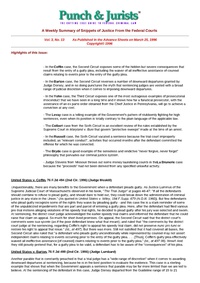Case held that the New York City School Construction Authority was an organization that received more than $10,000 of Federal program benefits and therefore was subject to 18 USC § 666, even though it received those funds indirectly.
Case held that the School Construction Authority's receipt of funds …
While the court acknowledged that some courts have been "unwilling to make a broad generalization that those convicted of receiving child pornography also ordinarily abise children", it concluded that § 2G2.2 would apply to "a mere passive offender who has not engaged in distribution of pornography on a significant …
This case contains an excellent review of the rules established by the Supreme Court in Maryland v. Buie that govern "protective sweeps" made at the time of an arrest.
This case is noted because it contains an excellent review of the Supreme Court's holding in Maryland v. Buie, …
This is another one of those sick cases that exemplifies the Government's stubborn refusal to admit mistakes even though the mistake in question resulted in the imposition of a sentence that was ten times greater than it should have been. The defendant in this case was convicted of possession …
One of the parables that is constantly preached is that a trial judge has a "wide range of discretion" when it comes to awarding downward departures at sentencing, because he is in the best position to evaluate the evidence. This case is another example that shows that when the …
In this case the defendant, a now-former cop, was arrested and convicted of various drug and gun crimes, and he was ultimately sentence to 87 months in prison. His sentence was enhanced on the basis of an alleged sale of 57.80 grams of cocaine that was not charged in …
One of the parables that is constantly preached is that a trial judge has a "wide range of discretion" when it comes to awarding downward departures at sentencing, because he is in the best position to evaluate the evidence. This case is another example that shows that when the …
One of the sentencing issues covered in this case dealt with the defendant's contention that the false statements he made to his probation officer who was preparing his presentence report were not "material." The Court rejected that defense and ruled that "materiality does not require a factual nexus with …
Case examines drug mixtures in determining calculation of weight.
This is one of those perfectly outlandish cases, filled with sordid details about a prosecutor's personal mission to get a conviction at any cost and the active participation of the Chief Justice of Pennsylvania, that shakes one's confidence in the criminal justice system.
The defendant was accused of an …
One of the parables that is constantly preached is that a trial judge has a "wide range of discretion" when it comes to awarding downward departures at sentencing, because he is in the best position to evaluate the evidence. This case is another example that shows that when the …
In this case the defendant and a man named Stubbs were convicted of bank robbery and carrying a firearm during and in relation to the robbery in violation of § 924(c)(1). Only Stubbs possessed a gun.
Price never brandished a weapon, nor did the prosecution offer evidence that he …
The defendant in this case was sentenced to 100 months imprisonment as a career offender under the enhancement provisions of 21 U.S.C. § 841(b)(1)(D). Six months after he was sentenced, the Sentencing Commission adopted Amendment 506, which modified Application Note 2 of U.S.S.G. § 4B1.1 and which appears to …
